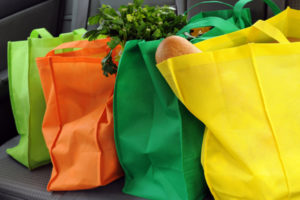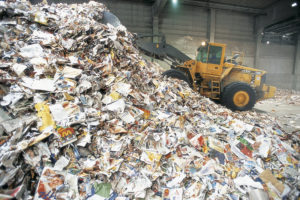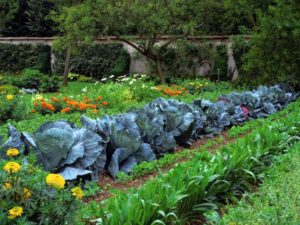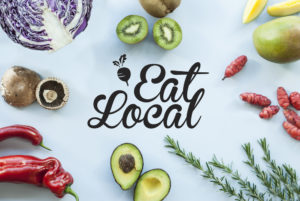7 Ways To Live More Sustainably
Sometimes it seems like sustainable and healthy living is put in the same basket as expensive living. This just simply isn’t true.
We all want to be better to our bodies and our environment, and there are some very smart and affordable ways of doing this…starting even today!
Here are some of the ways that I try to live more sustainably. Give them a try and let me know how they work for you. Also, please add tips that have helped you!
We’re all in this together.
Ditch the bottled water—get a metal water bottle instead.

(Photo Credit: Amazon)
Bottled water is a production of a lot of fossil fuels (more pollution) between what it takes to make them and then transport them and then store them. That’s a lot of energy for something you just throw away. AND they’re not that good for you either (enough of the plastic already). Instead, get a nice glass or metal water bottle that you can fill up time and time again.
Something like this metal water bottle on amazon will do the trick (and it tastes better and keeps it cooler).
Did you know that tap water has more stringent safety regulations than bottled water in the US? Yep. And if you’re still uncomfortable then make an investment in a filter. You’ll save money, energy, yourself, and the planet.
Reusable grocery bags.

(Photo Credit: StarTribune)
Really this could be any bag you want I guess…but my natural grocery store had some simple green bags made from recycled materials for $5 a piece, and I use them alllllll the time.
Sometimes it can be hard to remember to grab them before leaving, so keep them in a place you know you’ll look or write it at the top of your shopping list.
Using these grocery bags will help cut down on all the plastic bags that are thrown away each year. Plastic bags are awful! Like seriously…it takes something like up to 1,000 years to decompose. And they get in dolphins bellies, snag turtles mouths shut, kill birds because the swallow them, and a myriad of other awful things.
Additionally, plastic bags eat up a lot of fossil fuels (like oil) in its creation. Like up to 100 million barrels of oil are needed to make the plastic bags used in the world in just a year.
I can’t say it enough. Cut down on plastic.
Cut down on paper.

(Photo Credit: ZFrescueRangers)
Yes, it does help when you recycle paper instead of just throwing it away. But it helps even more to just reduce the usage of it totally.
This can be done very simply. Instead of writing things down on paper, I used a computer and my phone for notes, lists, to-dos, memos, etc.
Instead of getting receipts I use e-ticket or e-receipt options (helps to remember this when going to concerts, movies, flights, games, ordering on amazon, etc.)
Instead of using paper towels, use the air-dryers instead.
All these little choices really add up.
Cut down on air pollution.

(Photo Credit: Huffington Post)
Take a walk.
It’s harder in the US to walk places because we tend to be spaced out further from things than in other countries. Especially those of us in rural areas. However, sometimes we live close enough to things to make a walk of it. Get in some excercise. Make a family walk of it or even some couple bonding with your spouse. Great conversations can happen on walks.
Use your public transportation.
I live near a city that has lovely, free buses we can use that run on clean energy. They are amazing and really help out with pollution, yet many of us don’t use them because they don’t run on our schedule. Instead of thinking this way, maybe trying to adjust the mindset to ‘you’re adjusting your schedule to help out your family and environment’ might help.
Bike!
Yay, bikes. I love them…just with the US had more bike-friendly roads. Be safe if you choose to cycle.
Carpooling is a great way to cut down on pollution. Getting a ride places or pooling together on longer road trips is a great way to start living more sustainably.
Go green your home in simple ways.

(Photo Credit: ABetterEarth)
Going green also seems to have dollar sign connotations. But there are many ways you can go green in your home that are affordable.
There are so many benefits to being energy efficient. You save a lot of money, you keep your house clean, and you feel better about your impact on the environment.
While there are some bigger investments in going green that may cost more, there are simple ways you can do this.
- You can switch out your lightbulbs for energy LED efficient lightbulbs. They cost a little more upfront, but they last longer and save you a lot of money.
- Use a programmable thermostat to keep heat or cooling down when you don’t need it as much.
- Keep lights off and use natural lighting (sunlight) when you can.
- Reduce water usage—take shorter showers, run sprinklers at optimal times, switch out water-hungry lawns for garden space, etc.
- Recycle—recycling bins can be helpful when it comes to sorting it out.
- Give your dryer lint to the birds. They like it to build nests.
- Garden—cut down on mass production foods.
- Use home automation (such as smart lighting) to cut down on energy bills.
Look into state and federal tax incentives to help you cut costs in going green.
Though it is more of an investment, many states have qualifying homeowners for free solar panels. By free I mean they’re using federal tax incentives and rebates to hook people up with solar panels and then the homeowners basically buy the electricity from that solar company. So solar energy is actually much, much more affordable than you might think.
Grow a garden.

(Photo Credit: ABetterEarth)
Gardening is the best. I love eating my own fresh food, knowing what I put on it, and where it’s been.
Transporting mass production food emits a lot of fossil fuels. They’re usually grown with a large amount of pesticides that then leak into our water. It’s just not great.
Buying mass production just helps the whole pollution chain.
Which leads me to me next tip….
Buy locally…make friends with a farmer.

(Photo Credit: carolinekonarkowska)
For the same reasons gardening is awesome for sustainability.
It’s better to support your local economy and cut down on the pollution rather than contribute to the pollution mass production emits.
Eating seasonally also helps with this because you’re supporting local farmers and you get fresher food full of nutrients.
Also the food is 100 times better and, I think, healthier for you.
Hope this helps you all! Have fun feelings great and living more independently today.

Leave a Reply